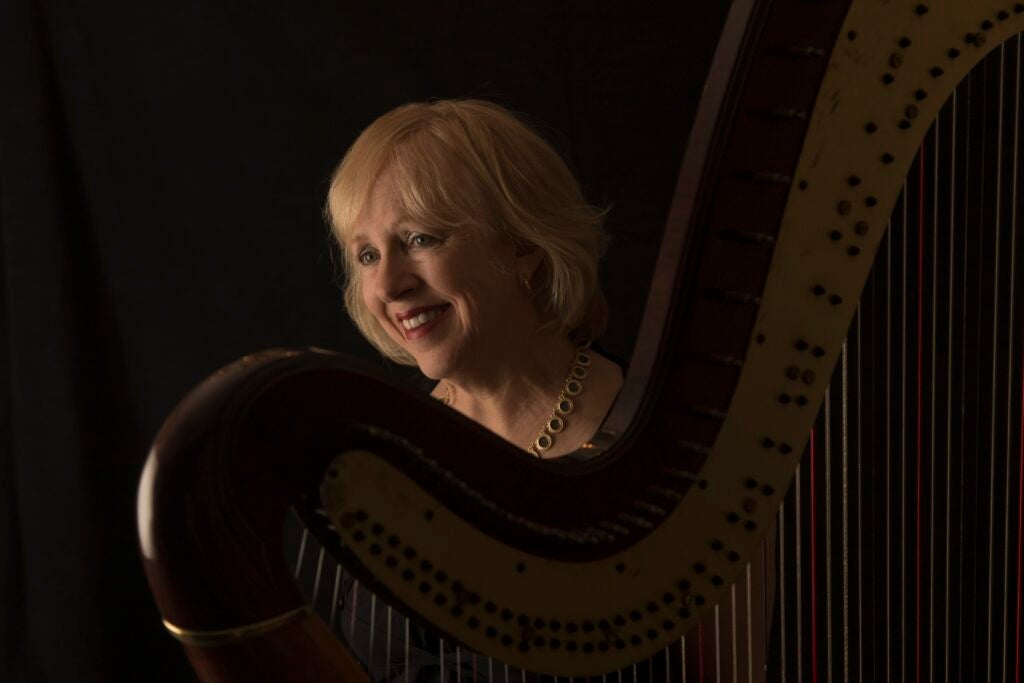Internationally-acclaimed composer and harpist Anne LeBaron marks her illustrious tenure at CalArts with a retrospective concert at UCLA’s Lani Hall, on Wednesday, February 7, at 7 PM. The program, encapsulating four decades of pioneering music, will be followed by discussion between the artists and the audience, and a reception.
Described by the Los Angeles Times as “a composer and alchemist of sound,” LeBaron’s compositions reimagine cultural narratives through her avant-garde lens. Of her performing career, the New York City Jazz Record extols, “LeBaron’s harpistry maps uncharted sonorities, her audacity in exploration yielding a soundscape as vast as it is vibrant.”
The evening unfolds around LeBaron’s lifelong passions, weaving a tapestry of music with drama, environmental advocacy, sounds and stories from around the world, the recognition of women’s achievements, and the spirit of artistic collaboration. This much-anticipated event will feature world premieres alongside rarely performed works.
The Program
“The Heroine with a Thousand Faces,” a prodigious new multi-year endeavor aiming to create one thousand musical portraits, launches with five original solos honoring women whose momentous contributions have reshaped our history. The prestigious Davise Fund facilitates these tributes by commissioning musical homages to figures such as Australian Saint Mary Helen Mackillop, Nobel Laureate Leymah Gbowee, and the indomitable Ruth Bader Ginsberg. Extraordinary saxophonist Jan Berry Baker will present world premieres of five such portraits, composed expressly for her.
Drawing upon recordings from Maui’s natural blowhole and a temple bell from Lahaina’s Jodo Mission, “Inner Voice” delves into our symbiotic relationship with nature by combining contrabass with the player’s voice and the earth’s whispers. “Green Card,” a segment from LeBaron’s opera Croak, itself an ecological allegory about the world’s declining amphibious population as told through the story of our planet’s last frog, Cassandra (originally performed by Kerry Washington, while still a student at George Washington University). In “Green Card,” dynamic tenor Timur Bekbosunov reprises the role of Goliath, the Herp Haven Hotel waiter, a bit of earnest comedy in a wildly inventive opera.
LeBaron’s environmental themes resonate in Crescent City, with Maria Elena Altany delivering “The Homesick Woman,” an aria steeped in maternal loss and storm-swept sorrow. Stage and Cinema acclaimed the experience of attending the production, “equal parts opera, avant-garde, art installation and phantasmagoria, the result, if you can handle it, is a jaw-dropping, perplexing, exciting, fun, challenging, exasperating, noteworthy, and exciting theatrical experience the likes of which you may never see again.”
Mark Swed, the LA Times music critic, may have put it best in his review of Crescent City: “We now have something that can genuinely be called L.A. opera.”
Accompanied by the Isaura String Quartet, Maria Elena Altany returns to the stage to channel the mythic Pope Joan in “Elegy.” The Isaura Quartet will also give the West Coast premiere of LeBaron’s “Noh Reflections,” performing the dazzling second movement of this work rooted in the sounds of Japanese Noh drama.
The concert will feature the premiere of “Two Kazakh Songs,” composed for Timur Bekbosunov as part of the large-scale “Silent Steppe Cantata.” The evening culminates with a graphic score inspired by Marcel Duchamp, “Infrathin IV,” an ensemble improvisation led by LeBaron that illustrates her significant influence on experimental harp performance techniques. Describing her 2-CD recording, “1, 2, 4, 3”, The New York City Jazz Record writes, “The artist inhabits her massive instrument as if it were a continent; she fords its rivers of strings and discovers new worlds in the crevices of tonality… nervous and hoarse and brilliant. LeBaron is a true “stratigrapher” in her layering of material, where new vistas seem to unfold endlessly behind others.”
Anne LeBaron
Hailed by The New Yorker as an “unusually inventive composer,” an “innovative [harpist],” and overall “admired West Coast experimentalist,” Anne LeBaron’s compositions resonate worldwide—performed from Kazakhstan to Italy to New York. Merging classic grandeur with avant-garde dynamism, her seven operas evoke tales of iconic figures like Pope Joan, Aldous Huxley, and Marie Laveau. Described by the LA Times as a “composer as transformer,” and “idiosyncratic visionary” whose music is at once “provocative,” “powerful,” and “always changing, and always captivating” LeBaron has and continues to masterfully explore myriad cultural and philosophical topics through music.
A Los Angeles-based experimentalist who is an innovative performer on the harp as well as a composer embracing unusual challenges, Anne LeBaron’s compositions have been performed around the globe. Venues in Italy, Mexico, Sydney, Vienna, Sweden, Kazakhstan, New York, Los Angeles, Italy, and elsewhere have programmed her works for chamber ensemble, orchestra, opera, and chorus, and presented her as a performer. Major awards she has received include the Alpert Award in the Arts, a Fromm Foundation commission, a Guggenheim, a Fulbright, and NEA grants. Her operas celebrate legendary female figures, such as Marie Laveau in Crescent City. She is currently completing LSD: Huxley’s Last Trip, an opera that includes many of the instruments built by Harry Partch. Her newest opera-in-progress, This Lingering Life, examines the notion of karma, with a libretto by Mark Campbell and Chiori Miyagawa. LeBaron teaches in the Experimental Sound Practices and Composition Program at CalArts.
Credits
This event is co-sponsored by the UCLA Department of Musicology, the Department of Music, the Center for Musical Humanities, the Center for the Study of Women|Streisand Center, and the UCLA Music Library Davise Fund.


